Meet the CALS Research Division team
The CALS Research Division facilitates research in the college, striving to help scientists meet compliance regulations and foster the ethical stewardship of research funds. They are home to the Wisconsin Agriculture Experiment Station, handling the administration of USDA capacity funds (Hatch and McIntire-Stennis projects) and sponsored research funding. They are also the college’s liaison with the Office of the Vice Chancellor for Research and provide oversight for the statewide network of Agricultural Research Stations.
Meet the CALS Research Division team members and learn more about their areas of expertise below. Click on each person’s name for a more detailed Q&A.
Troy Runge
Troy Runge is the associate dean for research as well as a professor in biological systems engineering. He leads the Research Division, developing new capabilities and managing special initiatives in the research space. He works with all CALS departments and centers and primarily answers questions about new opportunities or unusual situations.
Sandy Fowler
Sandy Fowler is the assistant dean for research and manages a team of experts that work on proposals, agreements, grants and program funding. She works with all CALS departments and centers helping researchers navigate regulations and answering questions about funding tools.
Sarah Johnson-Schlueter
Sarah Johnson-Schlueter is the compliance manager. She reviews CALS awards and contracts for compliance, ensuring trainings are complete and that required protocols are in place. She works with all department and centers in CALS. She answers questions about compliance, animal care, accreditation and other protocol issues.
Casey Hillmer
Casey Hillmer is the assistant director of WI Agricultural Experiment Station and reports to Sandy Fowler. She manages the USDA NIFA capacity program and internal CALS proposal competitions. She works with all CALS departments and center as well as the ag stations and is the post-award contact for biochemistry. She can answer questions about NIFA reporting, proposal submissions and gifts-in-kind.
Sarah Rudnick
Sarah Rudnick is an agreement and contract negotiator and reports to Sandy Fowler. She reviews contracts and other agreements. She currently works with all CALS departments and centers but will divide them with Becky Lowery in the future. She can answer questions about what type of agreement is needed, what should be included and the process to follow for a given agreement.
Becky Lowery
Becky Lowery is also an agreement and contract negotiator and reports to Sandy Fowler. She reviews agreements and currently works with all departments and centers. She answers questions about databases entries, the appropriate agreement for a project and timing of an agreement.
Pre-award team
Megan Maguire
Megan Maguire is the pre-award sponsored programs grants and contracts manager. She reports to Sandy Fowler and coordinates the pre-award team. The team assists departments with their grant submissions and bridges the gap between departments and campus offices. Maguire works with a number of CALS departments and centers (click on her name for a specific list) and answers questions about tools and processes or where to find resources and guidance.
Ryan Dunn
Ryan Dunn is a grants and contracts specialist and reports to Megan Maguire. He reviews grants and ensures budgets adhere to specifications of a program. He currently works with the bacteriology and food science departments with more departments being added soon. He answers questions such as what materials are necessary for a grant application and what a grant budget would be.
Martin Lea
Martin Lea is a pre-award sponsored programs grants and contracts specialist. He reports to Megan Maguire. He helps departments create and review grant submissions and award setups. He works with biological systems engineering, plant and agroecosystem sciences, soil science, the Land Information & Computer Graphics Facility and the Wisconsin Crop Innovation Center. He can answer questions related to grant submissions.
Post-award team
Vicki Schamens
Vicki Schamens is a post-award research financial manager. She reports to Sandy Fowler and manages the post-award team. She helps researchers spend awarded money within the parameters set by the award and the University. She works with CIAS, animal and dairy sciences, entomology, plant pathology, forest and wildlife ecology and the ag research stations. She can answer questions about awards and university policy.
Limin Tang
Limin Tang is a post-award accountant and reports to Vicki Schamens. She helps departments coordinate sponsored projects and manages HATCH projects. She works with biological systems engineering, life sciences communication, bacteriology, genetics, community and environmental sociology, soil science, SoHE and Ved Med. She answers questions about PI changes, external sub award invoicing and modifications, rebudgets and allowability. She can also help facilitate no-cost extensions through RAMP.
Noelle Wilharm
Noelle Wilharm is a post-award accountant and reports to Vicki Schamens. She reviews and processes sponsored projects and Hatch projects. She works with CALS Global, the Center for Dairy Research, the Dairy Forage Research Center, food science, FRI, plant and agroecosystem sciences, nutritional sciences, and the Wisconsin Crop Innovation Center. She answers questions about PI changes, external sub award invoicing and modifications, rebudgets, allowability and no-cost extensions through RAMP.
Q&A with Troy Runge
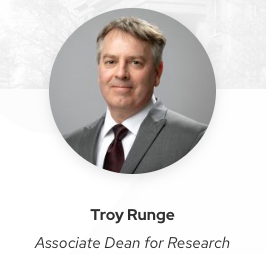
Who do you report to?
Dean Glenda Gillaspy
Can you describe your job?
I lead the Research Division, which is responsible for facilitating research for CALS investigators from grant submission to research compliance. On a practical level, I primarily work on developing new capabilities and managing special initiatives for the college in the research space. I am also a professor in biological systems engineering and have an active research program in the Wisconsin Energy Institute.
What departments/centers do you work with?
I work with all the CALS departments and centers.
What types of questions from CALS faculty and staff would you answer?
I primarily answer the atypical questions around new opportunities or unusual situations from CALS faculty and staff. I also get a fair amount of resource-type questions including types of funding and who the experts are on campus.
What do you like best about what you do? And what is the most challenging aspect?
I really like the exposure to all the research that goes on in CALS. The college is amazingly diverse in our research areas, and it is quite a privilege to learn about all the impacts our faculty, staff and students make. The most challenging aspect is just the sheer volume of things to do, and things I would like to do.
Q&A with Sarah Johnson-Schlueter
Who do you report to?
Troy Runge
Can you describe your job?
I review all CALS awards and contracts for compliance to ensure trainings are complete and required human subjects, biosafety, and/or animal use protocols are in place. I manage CALS hemp research and animal program compliance, attend all semi-annual Animal Care and Use Committee (ACUC) inspections, and facilitate our triennial AAALAC accreditation review of the CALS animal program. Additionally, I manage and review Outside Activities Reports (OARs) and the associated Conflict of Interest (COI) management plans and Conflict of Commitment (CoC) requests.
What departments/centers do you work with?
I work with all departments and centers in CALS. I also work closely with the Research Animal Resources and Compliance unit (RARC), am a non-voting member of the CALS ACUC, and a consultant on the All Campus Animal Planning and Advisory Committee (ACAPAC), the Institutional Biosafety Committee (IBC) and the COI committee.
What types of questions from CALS faculty and staff would you answer?
I answer questions regarding compliance for RAMP records, addition of funding to required protocols, export control, COI, CoCs, OARs, COI Management Plans, animal care and use and AAALAC accreditation preparation, hemp research, and the use of controlled substances in research including the associated State of Wisconsin Special Use Authorizations (SUAs) and federal Drug Enforcement Administration (DEA) registrations.
What do you like best about what you do? And what is the most challenging aspect?
What I like best about my job are my regular visits to the animal facilities and farms and interreacting with the animals, particularly our cattle and swine. The most challenging aspect of my job is preparing for the triennial AAALAC accreditation review.
Q&A with Sandy Fowler
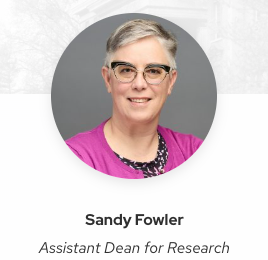
Who do you report to?
Troy Runge
Can you describe your job?
I manage a wonderful crew of experts that process proposal and agreements and manage grant and program funding. I help researchers and grant managers navigate through federal, state and UW regulations to make sure we’re being good stewards with grant funding.
What departments/centers do you work with?
All of them.
What types of questions from CALS faculty and staff would you answer?
Can we pay for…? How do we pay for…? How much funding do I have left? What do I need to do in RAMP, ECC, cost transfer tool, subaward portal?
What do you like best about what you do? And what is the most challenging aspect?
My day is never the same and with almost each situation, I learn something. What I like even more is knowing I helped someone learn something new too. Most challenging is keeping up with emails.
Q&A with Casey Hillmer
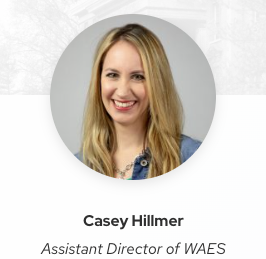
Who do you report to?
Sandy Fowler
Can you describe your job?
I manage the USDA NIFA capacity program (fund 142), which is unique to CALS. This program is funding from USDA NIFA to support agricultural research. This means I handle the proposal submission, technical and financial reporting, and billing for expenses. I also manage various internal CALS proposal competitions, such as the Kickapoo Valley/Nuzum fund and ARS Summer Internships.
What departments/centers do you work with?
I work with all CALS departments/centers, Ag stations and sometimes Veterinary Medicine and School of Human Ecology.
What types of questions from CALS faculty and staff would you answer?
I answer various questions about RAMP, proposal submission and annual reporting in NIFA’s electronic reporting portal. I also assist in gift in kind questions.
What do you like best about what you do? And what is the most challenging aspect?
I thrive at customer service, so I love helping faculty and departments with various questions and helping them understand all the ins and outs of CALS pre/post award. Most challenging is forecasting budgets and what we can spend, usually two years out.
Q&A with Sarah Rudnick
Who do you report to?
Sandy Fowler
Can you describe your job?
I primarily review and negotiate contracts and other types of agreements for CALS.
What departments/centers do you work with?
At this time, I work with all CALS departments and centers, but my counterpart Becky Lowery and I are working to divvy up the departments and centers between us so it’s easier for faculty and staff to know where to go for help.
What types of questions from CALS faculty and staff would you answer?
I answer questions about what type of agreement is appropriate for the intended collaboration, what should and shouldn’t be included in the agreement and the process for routing that through CALS and the Office of Research and Sponsored Projects.
What do you like best about what you do? And what is the most challenging aspect?
I like learning about all the different exciting things taking place at the UW. It makes me proud to be a Badger! The most challenging part so far has been familiarizing myself with all of the resources available from templates to agreement manuals to trainings and knowledgeable colleagues. There is so much support available, but I have to find it first!
Q&A with Becky Lowery

Who do you report to?
Sandy Fowler
Can you describe your job?
I review agreements for sponsored projects (133 and 144), non-funded agreements, (Material Transfer Agreements, Non-Disclosure Agreements, Data Use Agreements), and Fee-For-Service agreements.
What departments/centers do you work with?
Currently all departments and centers within CALS who request the agreements above.
What types of questions from CALS faculty and staff would you answer?
How do I enter records into our agreement record database RAMP? Under which type of agreement is this activity that I am doing covered? The Company does not wish to use UW template, how should we proceed? Why is the agreement taking longer than I expected?
What do you like best about what you do? And what is the most challenging aspect?
I enjoy the challenge that comes with new questions each day. Sometimes, I get to meet a new person at the UW because I reach out to them for assistance, and that makes my work very interesting and fun. The exact same thing as I stated above for what I like best, is that it can be very challenging when there are new and different questions everyday. But, it definitely weighs in the “good and fun” column for me.
Q&A with Megan Maguire
Who do you report to?
Sandy Fowler
Can you describe your job?
I assist departments with their grant submissions and award setups. Divisions are the middlepersons for a lot of stuff on campus, and we bridge the gap between departments and campus offices (Research and Sponsored Programs). I also supervise the two other staff that do grant submissions.
What departments/centers do you work with?
agricultural and applied economics, animal and dairy sciences, bacteriology, biochemistry, community and environmental sociology, entomology, food science, forest and wildlife ecology (currently as both department and division contact), genetics, nutritional sciences, plant pathology, Center for Dairy Research, life sciences communication, Center for Integrated Agricultural Systems, Food Research Institute, ag research stations, any submissions dealing with the Dean’s Office directly, CALS Global, and Undergraduate Programs and Services.
What types of questions from CALS faculty and staff would you answer?
“How do I do this?” That question can be related to how to do a budget calculation, how to use the UW and Sponsor grant tools, using software, a process on campus, etc. “Where do I find this?” is another frequent question. It might have to do with campus information, sponsor information or federal guidance. “What does this mean?” is often asked related to sections of funding opportunities. “Why is [blank] taking so long?” This might refer to a person, process or notification.
What do you like best about what you do? And what is the most challenging aspect?
Each each grant is unique, and I will see something different with every single submission. I really like the people I work for (grant submitters and their admin support), and I hope it comes across how much I want to help them. And if a grant gets funded, that is the coolest thing ever. Finally, at least once a month I see a new sponsor, and I have to sit down and figure out what they want in a grant application. The challenging part is that very few grants don’t come with hard deadlines. Having a deadline-based job, where literally one second late means a submission is refused, is not for everyone. I’ve seen hard work go down the drain over a technicality.
Q&A with Ryan Dunn

Who do you report to?
Megan Maguire
Can you describe your job?
I work in CALS with the pre-awards team. Prior to grants being formally submitted to an institution for funding consideration, it must be approved on a few different levels. I am one of those levels and ensure the grant budget adheres to the rules and specifications set forth in the program announcement.
What departments/centers do you work with?
Right now I work with bacteriology and food science with more on the horizon.
What types of questions from CALS faculty and staff would you answer?
What materials are necessary to apply for this grant? What would a preliminary budget look like?
What do you like best about what you do? And what is the most challenging aspect?
I enjoy the people I work with and the nuances of each grant proposal, which is also the most challenging part. Each proposal is different and there are very different but very specific rules each grant application must follow.
Q&A with Martin Lea
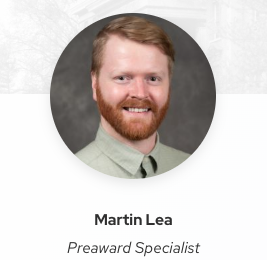
Who do you report to?
Megan Maguire
Can you describe your job?
I assist departments with the creation and review of grant submissions and award setups, and I work as a liaison between departments and our Office of Research and Sponsored Programs.
What departments/centers do you work with?
biological systems engineering, plant and agroecosystem sciences, soil science, Land Information & Computer Graphics and Wisconsin Crop Innovation Center
What types of questions from CALS faculty and staff would you answer?
I help with questions related to grant submissions, including those about funding opportunities, guidance for proposal submission, budget creation, and the usage of RAMP and other submission systems.
What do you like best about what you do? And what is the most challenging aspect?
I enjoy providing support to CALS faculty and staff, particularly when it comes to figuring out complex grants or puzzling out difficult budgets. Keeping up with the different policies of all the sponsors that we work with can be a challenge, and for most proposals those sponsors have required deadlines. There can be a lot of added pressure when it comes to reviewing and polishing proposals as those deadlines near.
Q&A with Vicki Schamens
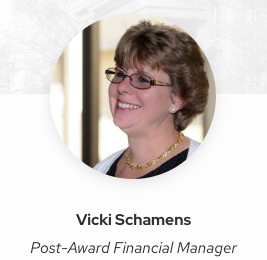
Who do you report to?
Sandy Fowler
Can you describe your job?
My job entails helping the PI spend their awarded money within the parameters that are set by the award and University policy, while also supervising others who do the same. More specifically currently my job is supervision of Post Award Grant Accountants, post award WAES Hatch awards, Division approver for: transfers, Divisional RAMP modifications, Subaward modification and interdepartmental charges for the departments I work with.
What departments/centers do you work with?
I work with CIAS, animal and dairy sciences, entomology, plant pathology, forest and wildlife ecology and the ag research stations.
What types of questions from CALS faculty and staff would you answer?
I answer questions on if something would be allowed on an award or if something can be purchased using a specific funding. I answer the “How do I…” questions whether they are how do I complete a process or how do I find the specific form needed. I help people find the answers to university policy and procedures questions too.
What do you like best about what you do? And what is the most challenging aspect?
I like what I do because my job lets me help other people and learn new things. I like to help people get things done while also staying within university policies and award parameters. The most challenging aspect of my job is finding solutions to the many unusual questions or situations that come to me, but then I get to know something new at the same time.
Q&A with Limin Tang
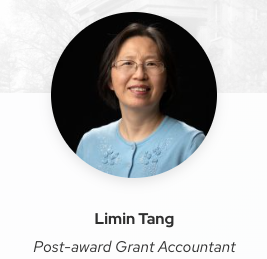
Who do you report to?
Vicki Schamens
Can you describe your job?
Help departments in CALS to manage sponsored projects to make sure every transaction charged to sponsored project is necessary, reasonable, allocable, allowable, consistently treated and permissible. I also manage USDA HATCH projects from setup to closeout.
What departments/centers do you work with?
I work with biological systems engineering, life sciences communication, bacteriology, genetics, community and environmental sociology, soil science, SoHE and Ved Med.
What types of questions from CALS faculty and staff would you answer?
Cost share, PI change, project closeout, cost transfer, sub invoices.
What do you like best about what you do? And what is the most challenging aspect?
What I like the best about what I do is helping PIs and department staff solve their problems. I am still learning RAMP. I hope I will fully understand and can do all post awards management in Workday in the future.
Q&A with Noelle Wilharm
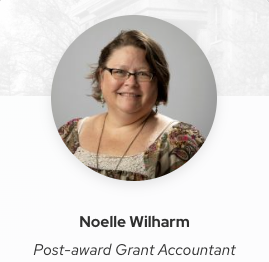
Who do you report to?
Vicki Schamens
Can you describe your job?
I review and process financial expenses on sponsored projects, set-up/monitor/close Hatch projects (projects from USDA that are specifically for land-grant universities), and process and submit to RSP any changes that must be submitted to the sponsor once the project is agreed upon and set up.
What departments/centers do you work with?
I work with CALS Global, the Center for Dairy Research, the Dairy Forage Research Center, food science, FRI, plant and agroecosystem sciences, nutritional sciences, and the Wisconsin Crop Innovation Center.
What types of questions from CALS faculty and staff would you answer?
I answer a lot of travel policy questions and questions on UW–Madison processes. When we have new software programs I become the hub of how to questions and then I take those questions and share the “how-to” with my departments. Those are my “Tips and Tricks” emails.
What do you like best about what you do? And what is the most challenging aspect?
There is a lot I love about my job. I really like to help people. I like to review expenses. I have an audit brain and I can spot possible issues easily. And the best things are that my job is different every day and the wonderful co-workers that I have. That said, the most challenging aspect is that my job is different every day and when I plan to work on a project, the universe sends me a lot of interruptions.

